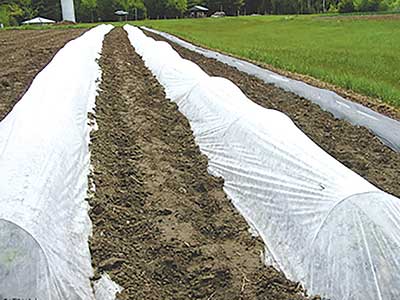 |
| Many agricultural plastics, including some row covers, are difficult or impossible to recycle. English photo |
By David McDaniel
In the summer 2019 MOF&G, I discussed how Maine farmers depend on many plastic products and the difficulties of recycling these materials. Here I review some of the limited ways to recycle agricultural plastic and types of plastic to limit or avoid.
The Good
Greenhouse plastic #4 LDPE – In spring 2020 UMaine Cooperative Extension will begin a pilot to collect and recycle much of Maine’s estimated 30 tons of annual waste greenhouse plastic, with funding from a Maine DEP Waste Diversion Grant. MOFGA’s Caleb Goossen, a grant investigator, says many MOFGA growers are interested in reducing plastic waste. He hopes this grant will begin to teach how to collect and recycle various agricultural plastics. Cooperative Extension and MOFGA will begin outreach for the program in early 2020.
Other clean #4 LDPE films – The market for clean wood pellet bags and similar stretch film bags is fairly stable. Most Maine recycling centers and some chain grocery stores accept clean, stretchy film bags.
Clear and colored containers #2 HDPE – Some liquid fertilizers, sanitizers and pesticides come in these containers. Most Maine recycling programs accept them. The Ag Container Recycling Council (ACRC) considers pesticide containers that are triple rinsed following EPA protocol to be safe for handling at recycling centers. The ACRC also contracts with the Mid-Maine Solid Waste Association in Dexter and Valley Recycling Facility in Frenchtown for bulk collection of triple-rinsed pesticide containers. FMI: https://www.acrecycle.org/
Nursery pots PP#5 and HDPE#4 and possibly seedling trays PS#6 – Home Depot and Lowes have programs for dropping off and recycling nursery pots. Home Depot works with East Jordan Plastics, a leader in horticulture plastic recycling.
The Bad
Dirty stretch films #4 LDPE – These include single-season thin mulch films and silage bales. No recycling center or company in Maine accepts these, except waste-to-energy plants. These dirty films can be washed and recycled with special equipment, but Maine lacks the volume to support that infrastructure. A small-scale user could wash the plastic, but soil particles often remain embedded in it. Avoid this until commercial washing/recycling is available.
Drip irrigation tape #4 LDPE – Drip tape should be easily recyclable, but no one in Maine accepts it now because it tends to be contaminated with soil, and the long strands may clog baling equipment. Reuse and repair as long as possible.
Feedbags and 1-ton totes (supersacks) PP#5 – Parts of the United States recycle woven polypropylene bags, but Maine considers them too contaminated with feed waste. Local feed companies no longer accept their return. Repurpose as possible.
The Ugly
Spun polypropylene row cover PP #5 – Fabrics for season extension and insect exclusion should be recyclable, but I found no active recycling programs. Repeated exposure to UV light disintegrates some fabrics into plastic dust, so store them out of direct sun when not in use.
Woven poly tarps #4 LDPE – Nylon thread alternating with plastic ribbons make these strong but render the tarps unrecyclable.
About the author: David McDaniel co-owns and farms Earth Dharma Farm in Jackson, Maine. He chairs the Ag Plastic Recycling Committee for the UMaine Waldo County Extension Association and is a board member of the Unity Area Regional Recycling Center. Contact him at [email protected].
